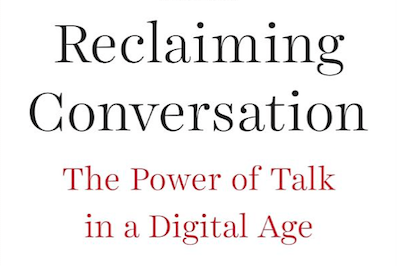Reclaiming Conversation
We live in a world of incessant connection, and for all the communication it supposedly provides, it's destroying open-ended conversation. "We are being silenced by our technologies," Sherry Turkle writes in a new book. Penguin Press
Penguin Press
Penguin Press
|
To see long excerpts from “Reclaiming Conversation” at Google Books, click here. |
“Reclaiming Conversation: The Power of Talk in a Digital Age” A book by Sherry Turkle
You’re at the dinner table, or in a meeting, or at a baseball game, or in the classroom, or in your bedroom, or at a bar or, yes, in the bathroom — and you’re on your phone. You might be talking, but more likely you’re texting, posting, swiping, liking, tweeting, buying, browsing or, in my favorite metaphor of digital existence, “refreshing,” as though life’s staleness can be washed away with every new, fully realized screen.
This is the world of incessant connection, and for all the communication it supposedly provides, it’s destroying one essential thing: open-ended conversation. “We are being silenced by our technologies,” Sherry Turkle warns, “in a way, ‘cured of talking.’ ” And that silence means our ability to relate to others is disappearing, too. “We face a flight from conversation that is also a flight from self-reflection, empathy, and mentorship.”
A psychologist and the director of MIT’s Initiative on Technology and Self, Turkle has studied our relationship with technology for decades, showcasing her findings in works such as “Life on the Screen” and “Alone Together.” And while it is tempting to lump “Reclaiming Conversation” with so many tech-skeptic manifestos — such as Jaron Lanier’s “You Are Not a Gadget” or Nicholas Carr’s “The Shallows” — and assume we’ve heard it all before, that would be a disservice to author and reader. This is a persuasive and intimate book, one that explores the minutiae of human relationships. Turkle uses our experiences to shame us, showing how, phones in hand, we turn away from our children, friends and co-workers, even from ourselves.
“I had three chairs in my house,” Henry David Thoreau wrote in “Walden”; “one for solitude, two for friendship, three for society.” Thoreau’s chairs are a recurring theme for Turkle. Solitude, with the self-awareness it affords, helps us understand ourselves, she argues, which is essential to understanding others. Our conversations with other people — at home and school, in the workplace and the public square — put that empathy to work, sharpening our capacity for introspection. Reflect, talk, repeat.
But technology interrupts this cycle; it ends conversation. Our relationships now come stamped with “the assumption of divided attention,” Turkle explains. Reclaiming conversation is about “reclaiming our most fundamental human values.”
We are drawn to those sleek devices — always in our hands or always at hand — because they seem to grant three wishes: “First, that we will always be heard; second, that we can put our attention wherever we want it to be; and third, that we will never have to be alone.” A fourth wish, Turkle explains, is implied: that we will never be bored.
But in the rush to be heard by people far away, we lose those closest to us. “Many young people are growing up without ever having experienced unbroken conversations either at the dinner table or when they take a walk with parents or friends,” Turkle writes. She shows children confronting their parents — “Daddy! Stop Googling! I want to talk to you!” — and notes that even well-intentioned parenting can backfire. A 37-year-old father goes on a school field trip with his 7-year-old, but spends his time posting and sharing photos about it. “All of a sudden I realize as I’m sitting there that Simone has been sitting there for, like, an hour, without me saying a word to her,” he tells Turkle. Even when we think we’re most engaged, our phones separate us.
Children learn that “no matter what they do, they will not win adults away from technology,” Turkle writes. “We see children deprived not only of words but of adults who will look them in the eye.”
The longer they are denied, and the longer they immerse themselves in their own devices, the harder it is for children to relate to peers as they grow older, Turkle emphasizes. The phone becomes a refuge. “When I go to check my messages, I am technically going to check for which people reached out to me,” explains Arjun, a college senior. “But let’s say I see there are no new messages. Then I just start to check things — Twitter, Instagram, Facebook — the familiar places to me. Now, it’s just the phone that is a comfort. The phone that is the friend.” Fear of missing out, Turkle writes, has become fear of missing anything.
College students see constant connection “as a necessity,” the author reports. Nine out of 10 admit to texting in class, and one described her phone as an “insurance policy” against boredom — a telling notion when we consider that being bored can propel creativity. “Childhood boredom is a driver,” Turkle writes. “It sparks imagination. … Negotiating boredom is a signal developmental achievement.” Instead, we skip it.By adulthood, the ubiquity of the phone and the applications we access have not only stunted identity but confused it. A 34-year-old woman admits to Turkle that she spends time online performing “a better version of herself — one that will play well to her followers.” Our focus shifts from reflection to self-presentation and instant feedback. “We are asked to see ourselves as the collection of things we are told we should want,” Turkle laments. “Is this a tidier version of identity?”
At work, screens and tabs demand our attention. Young employees believe they are maximizing, but “when we think we are multitasking,” Turkle writes, “our brains are actually moving quickly from one thing to the next, and our performance degrades for each new task we add.” The results are comically depressing. A young management consultant jumps on Facebook during a client meeting because, she said, her “part” of the presentation was done. A financial services employee feigns illness so he can stay home, leave behind technological distractions and actually complete an assignment. A Chicago law partner gives an internal presentation to a room full of colleagues texting and e-mailing. Her topic? Intrafirm communications.
Technology even purports to make romance efficient but instead complicates it further, with dating apps providing the illusion of infinite choice. When your lover gets out of bed, why not steal a moment to swipe through a few potentials? “When people are just a click away,” a college senior explains, “it is tempting to never settle.”
And when relationships are mediated through text messages more than face-to-face encounters, complications multiply. Turkle offers the sad story of Adam, 36, who pores over three years of texts between him and his ex, some 30 to 50 messages each day, trying to understand what went wrong. He crafted his messages carefully but always assumed hers were spontaneous. Now he isn’t sure and wonders if his “in-person self” failed to measure up. He parses punctuation of old texts, a prisoner of his archive. “How do you know someone in a true way?” Adam asks.
We think our devices deliver comfort and efficiency, but, in Turkle’s telling, they offer loneliness and disarray. “Every time you check your phone in company,” she reminds, “what you gain is a hit of stimulation, a neurochemical shot, and what you lose is what a friend, teacher, parent, lover, or co-worker just said, meant, felt.”
Everyone can find something in “Reclaiming Conversation” to induce guilt. (Confession: I’ve been that Facebook-posting dad.) Still, Turkle places much blame on one technology, and at times it’s overkill. I don’t recall all our relationships being blissfully fulfilling before smartphones. Weren’t we bowling alone in the mid-1990s already? “We cannot know if the parents we see ignoring children would be more attentive if they didn’t have phones,” Turkle admits. “What we do know is that our phones are seductive.” Television was seen that way as well, but somehow Turkle considers it more benign. “If you take advantage of the fact that it can be used socially,” she writes, “it can also bring families together.”
The author’s prescriptions often read like captions for corporate motivational posters. “Slow down.” “Protect your creativity.” “Create sacred spaces for conversations.” Some suggestions seem obvious, but perhaps there are times when we need to hear obvious things. “Instead of doing your email as you push your daughter in her stroller, talk to her,” Turkle writes. “Instead of putting a digital tablet in your son’s baby bouncer, read to him and chat about the book.” And she hopes, perhaps too optimistically, that the design of technology will begin to alleviate — rather than exploit — our vulnerabilities.
To her credit, Turkle doesn’t ask us to get rid of our phones altogether. They “are facts of life and part of our creative lives,” she writes. “The goal is to use them with greater intention.” As Thoreau might say, more deliberately.
Carlos Lozada?is the nonfiction book critic of The Washington Post.
©2015, Washington Post Book World Service/Washington Post Writers Group
Your support matters…Independent journalism is under threat and overshadowed by heavily funded mainstream media.
You can help level the playing field. Become a member.
Your tax-deductible contribution keeps us digging beneath the headlines to give you thought-provoking, investigative reporting and analysis that unearths what's really happening- without compromise.
Give today to support our courageous, independent journalists.




You need to be a supporter to comment.
There are currently no responses to this article.
Be the first to respond.